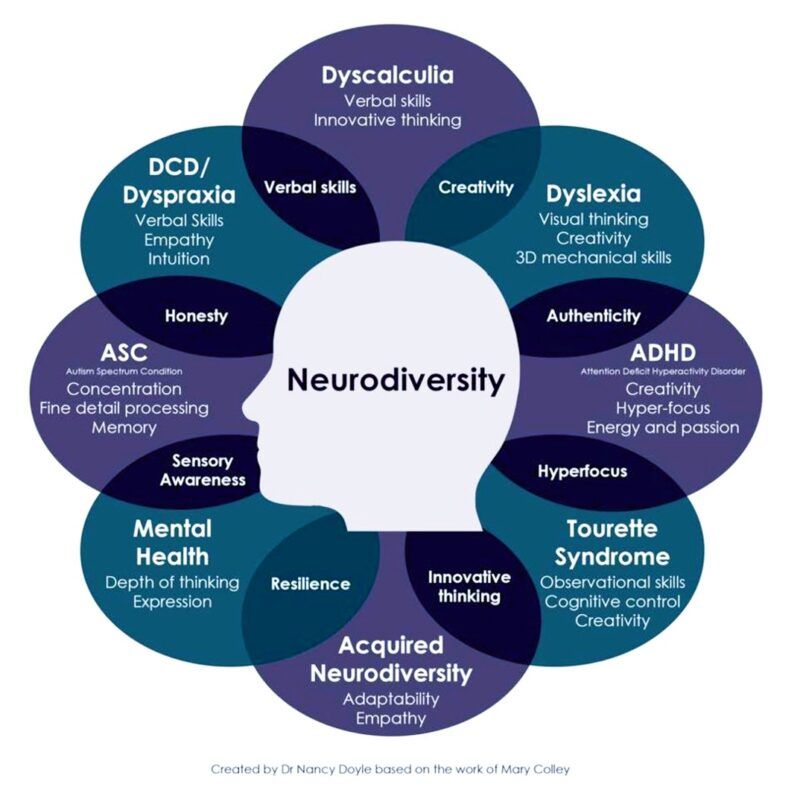Navigating Neurodiversity: Bridging Gaps in Therapy and Advocacy
Neurodiversity Attuned Therapy needs to happen now

For far too long, neurodivergence has been misunderstood and overlooked, particularly in adults and children who tend to sit quietly in the background, flying under the radar while working hard to fit in. As research has progressed, it has become evident that neurodivergence exists on a broad spectrum, often accompanied by co-occurring issues like trauma, anxiety, and depression.
What is NeuroDivergence?
Neurodivergence is the term for when someone's brain processes, learns, and/or behaves differently from what is considered "typical." (See the Very Well Mind website for a more complete understanding). Many diagnosis fall under the umbrella of Neurodivergence, such as ADHD, Autism, AudHD, Dyslexia, Tourette, OCD, etc, (see image above the text, a non exhaustive view of Neurodiversity by Dr Nancy Doyle). Many neurodiverse individuals experience two or more types, while others have yet to find a diagnosis that fit them.
When adults seek therapy, it's often due to a struggle to fit in, an experience of depression or anxiety, or a feeling of overwhelm toward what is expected of them. Clients sometimes mention that they were treated for ADHD as children, and that somehow as adults they were expected to fall into the "normal" range of thinking, feeling and functioning. Traditional adult therapy seeks to treat symptoms without fully adapting interventions to encompass the diversity within neurotypes.
Unfortunately, graduate and postgraduate trainings often lacks in those adaptations, leaving many behind both in terms of neurodiverse therapists and clients. This is a cycle of lack or training, lack of adaptability within trainings, and an ignorance around neurodiverse clients that keep many of them from continuing therapy, thinking that there is something drastically "wrong" with them that a therapist can't "get" them.
The recent diagnosis with my own neurodiversity spurred me to delve deeper into the concept of neuro-affirming psychotherapy. I embarked on a journey, interviewing three neurodivergent therapists in Colorado to understand how they approach therapy differently from the neurotypical model. Through this series of blogs, I aim to share my findings, recognizing that while subjective, they contribute to an emerging movement of neurodiversity-affirming approaches within counseling.
In the upcoming blog posts, I'll explore various aspects of neurodiversity-affirming psychotherapy:
- 1. Therapeutic Relationship and Format: Delving into the differences between neurotypical and neurodivergent styles of therapy, highlighting the importance of tailoring therapeutic approaches to individual neurotypes.
- 2. Neurodivergence from a Nervous System Perspective: Examining how understanding neurodivergence through the lens of the nervous system can lead to a more trauma-informed approach to therapy, recognizing the interconnectedness of neurodiversity and trauma.
- 3. Insights from Neurodivergent Therapists: Sharing pearls of wisdom gathered from interviews, encouraging therapists to learn from neurodivergent perspectives and empowering clients to navigate the therapeutic landscape more effectively.
Ultimately, advocacy for neurodiversity begins with education. By bridging the gap between providers and clients through understanding and guidance, we can dispel misconceptions, strengthen therapeutic relationships, and ensure more congruent and effective treatment for all individuals, regardless of neurotype. Join me on this journey of exploration and advocacy as we strive for a more inclusive and affirming approach to psychotherapy.









